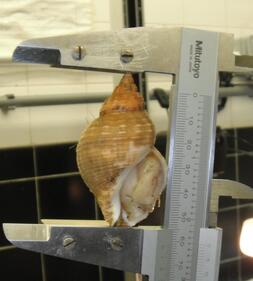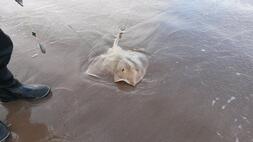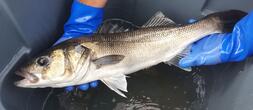Fisheries Research & Management Plans
- Home
- Environment & Research
- Fisheries Research & Management Plans
Page review/updated 04/12/2024
(Content of overview page last updated: 4th July 2022)
In April 2021, D&S IFCA completed an initial series of Fisheries Research and Management Plans (FRMPs). This work began in January 2020 as a “legacy” project from the North Devon Marine Pioneer, in partnership with the North Devon Biosphere. These plans have reviewed the ecology, fisheries, management, and threats for five species/ species groups of commercial importance in the Bristol Channel: herring, bass, whelk, squid and skates and rays, with each of these species/ species groups having its own FRMP.
In addition to each species-specific FRMP, a shorter summary document has been produced summarising the research and management recommendations for each species.


The full FRMPs and summary documents can be found here.
The FRMPs have included both scientific and local anecdotal information from thorough literature reviews and engagement with fishers, creating a diverse package of information. They also consider a broader range of activities than would typically be included in a fisheries management plan, providing a first step towards a local application of the Ecosystem Approach. By reviewing all the available information, each FRMP identifies gaps in knowledge that may be hindering current fisheries management, and then makes recommendations for research and management to work towards filling these gaps and ensuring, in future, these fisheries are managed more effectively and sustainably.
WHO ARE FISHERIES RESEARCH AND MANAGEMENT PLANS FOR?
FRMPs help D&S IFCA to highlight, rationalise and prioritise future research as well as identify any considerations for changes to management within D&S IFCA’s remit and ability, through its Permitting Byelaw approach. Where the findings of the reviews have implications for management outside of D&S IFCA’s responsibility, the FRMPs provide an evidence base which D&S IFCA can use to work with other agencies and organisations to move towards more appropriate management. Examples of this could include development of national policy, Fisheries Management Plans (FMPs) under the Fisheries Act (2020), or the iterative progression of Marine Plans.
It is also hoped that FRMPs will be useful as one-stop-shop of fish and fisheries knowledge and source of research opportunities for a wide range of stakeholders including academic researchers, NGOs, recreational and commercial fishermen, marine licencing officers, marine planners and developers.
WHAT DO FISHERIES RESEARCH AND MANAGEMENT PLANS INCLUDE?
Species Ecology
A thorough review of species ecology is required as a starting point for understanding any possible considerations for future management. Information on the geographic range, migration and movements, conservation status/designation and life history strategy are described for the target species. There is also a focus on essential fish habitats, as well as any relevant food web information. The reviews of species ecology critically evaluate the available information and consider sampling limitations and biases of existing data sources in order to identify any gaps in our current knowledge.
The FRMPs also take a pioneering approach to incorporating local anecdotal information from both contemporaneous and historical sources. Local knowledge and experiences have proven to be vital in highlighting avenues for research and considerations for management.
Specific Fisheries Information

A detailed description of the fishery is included in each FRMP, including the importance of the fishery locally and nationally, the history of the fishery, information on landings and value, descriptions of gear used, and the status/health of stocks.
This work integrates information from a variety of sources, from ICES stock assessments to local knowledge, to provide a thorough description of the fishery at a range of scales.
Fisheries Management Information
Fisheries are considered within the context of the relevant local, national and international management, with brief summaries of the management measures currently in place being included in each FRMP as well as the rationale behind them.
Review of Threats to Species & Industry
A thorough literature review highlighting threats to the species both on a local and large-scale is included in each plan, using an ecosystem-based approach. This allows the FRMPs to consider a wider range of factors that can affect fish populations, which are often overlooked in traditional fisheries management, for example, aggregate dredging, coastal development, etc.
Engagement from local fishers and stakeholders is also vital to this process, to highlight pressures facing local fish populations and how this may in turn affect fisheries. This process also allows local fishers to highlight how they feel current fisheries management could be improved and assess if their interests are being appropriately represented.
Recommendations for Future Research & Management
From the large body of evidence gathered throughout each FRMP, recommendations are then made for both research and management. Research topics and opportunities are highlighted that, if addressed, will pave the way for more robust and effective management of the fisheries. The FRMPs also suggested potential management options that are aimed at benefitting both the target species and the fishers.
THE PLAN FOR FRMPS MOVING FORWARD
The five initial FRMPs have yielded a large range of research and management recommendations aimed at improving knowledge and management of fisheries both locally, within the Bristol Channel, and nationally. For example, on a local scale, the FRMPs recommend investigating the disappearance of squid from the Bristol Channel over the past two decades and trialling whelk fishing effort limitations within D&S IFCA’s District. Larger-scale research and management recommendations from the FRMPs include implementing a more effective MCRS system for whelk fisheries across the UK, improving landings data collection for the <10m fishing fleet (which will also allow their interests to be better represented in management discussions), and realigning aspects of marine and spatial planning so that environmental and fisheries concerns are more easily raised and thoroughly considered.
National policy drivers such as the Government’s 25YEP and the implementation of the Fisheries Act have committed to an ecosystem-based approach to fisheries management. Fisheries Management Plans (FMPs) are a key requirement of the Fisheries Act and will form the basis of future UK fisheries management. Importantly, there is strong support from the MMO to use D&S IFCA’s FRMPs to feed into FMP development.
Due to this interest in FRMPs, and their relevance to the future management of UK fisheries, D&S IFCA will be continuing the FRMP workstream during the 2022/23 financial year, with a focus on expanding the current FRMPs to the rest of the D&S IFCA’s District and writing FRMPs for additional species. The upcoming FRMPs will deliver similar recommendations for research and management that can be fed into FMPs and help direct marine management at local to national scales. This work will involve extensive engagement with fishers and other stakeholders throughout the D&S IFCA’s District, and those interested are encouraged to get in touch using the contact details below:
Dr James Stewart
Senior Environment Officer
Email: J.Stewart@devonandsevernifca.gov.uk
